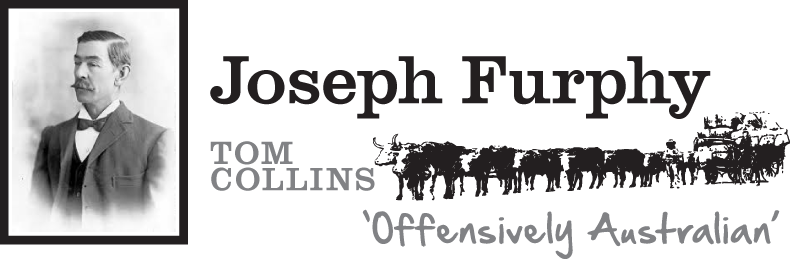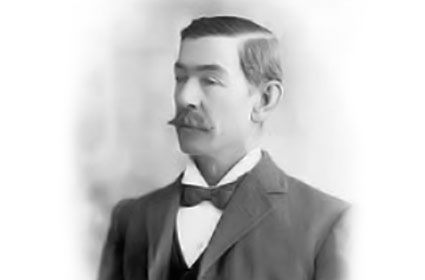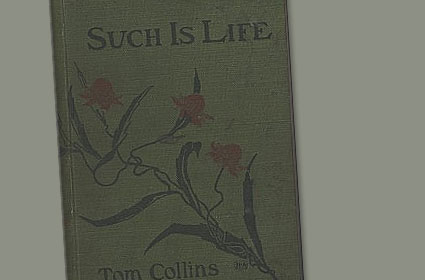In a letter to Cecil Winter on the 23rd of September 1903 Joseph Furphy writes, “One thing I can say for myself – I write only of what I know.”
What he had known was the life of a bullock driver traveling through Northern Victoria and Riverina, spending months on end with his bullocks, his loads and his schedule as his constant responsibility.
His evenings were spent under the stars with books and tales from fellow travelers for entertainment.
The disastrous drought of the early 1880’s led him to abandon this trade and settle in Shepparton, Central Victoria, where he found a position at his brothers Foundry.
In this same letter he describes how his new way of life availed him to writing.
“A few years ago, finding myself, for the first time in my life, with 16 hours “off” out of 24, and being constitutionally indifferent to what is called amusement, I bethought me of writing a yarn.”
After a long day of work he would settle into his sanctum, a lean-to at the back of his house, writing by the light of a kerosene lamp.
His major works follow
Such is Life
In 1897, using the pen-name 'Tom Collins,' Joseph Furphy believed he had written a moral for his age and, he hoped, a moral for all times and places about the human situation.
Like all great confessions about life it had come out of his own experiences, as a bullock-driver in the Riverina.
On the 4th of April 1897 Joseph Furphy wrote this letter to J.F. Archibald of The Bulletin.
Dear Sir,
Circumstances compel me to solicit a private reply of two or three words only.
I have just finished writing a full-size novel: Title, “Such is Life”; scene, Riverina and northern Vic; temper, democratic; bias, offensively Australian.
Now what publishing firm should I communicate with – Melbourne preferably, but not necessarily? I am absolutely in the dark here, and have no other referee. I am, Sir,
Yours very truly,
Joseph Furphy (Tom Collins)
After reading the handwritten manuscript the literary editor of the Red Page, A G Stephens, wrote back stating he believed the novel was “fitting to become an Australian classic”.
The Bulletin went on to supervise the Publication of the novel in August 1903. Furphy turned 60 the following month
Such is life sold about 1,100 copies altogether in Joseph’s life time. It is slow reading, rich in literary allusions the narrative giving way in places to apparent digressions by the narrator, the clownish Philosopher, Tom Collins
Currently in print with Halstead Press and available here on this website and at selected bookstore
Rigby’s Romance
Rigby’s Romance was an expanded and revised version of one of the deleted chapters of the original Such is Life. Not publish in book form during Furphy’s lifetime, His second novel was finally published in a condensed version in 1921 and for the first time in unabridged form in 1946
In the forward to this new edition R. G. Howarth states that ‘It is clear.. that Rigby’s Romance contains Furphy’s fully-framed “message”, which may now be received as a whole by the general public. Its purport is given in a sentence from another letter to Miles Franklin: “Unless the democratic movement makes people better – more intelligent, conscientious and humane – it is not worth support.”
Furphy regarded this one as the best of his books. In vintage Furphy style, issues of ideology, love and human nature are wound engagingly into a yarn about fishing—much of it delivered in the form of a dialogue not unlike Plato’s. As usual, bushcraft, the Bible, natural history and world literature make their appearance at just the right times.
Currently out of print
The Buln-buln and the Brolga
Like his previous book The Buln-buln and the Brolga was an expanded and revised version of one of the deleted chapters of the original Such is Life.
Not publish in book form during Furphy’s lifetime, It was finally published in 1948.
In the forward R.G. Howarth writes that ‘The Buln-buln and the Brolga, in that it fills out the portrayal of Tom, forms an essential-indeed, integral-part of the Collins saga; it is also an addition to the humorous chapters of Such is Life.’
Set on the Murray river in the early 1880’s, with his two main characters Fred, the gifted liar, and Bob, the teller of tall tales, Furphy gives us an insight into death, marriage, truth and deceit and brutalising encounters between a new Australian society and the indigenous culture of the Aborigines.
Currently in print with Halstead Press and available here on this website and at selected bookstore
Poems
Kate Baker who had become his friend and the author's champion in literary circles was profoundly moved by Furphy's death.
For three decades after his death, Baker worked tirelessly promoting Furphy's reputation, and was responsible for the republication of many of Furphy's works, including a collection of his poetry, published in 1916.
Currently out of print but some can be view through a link on this website
Short stories
Furphy also wrote numerous short stories including ‘My Uncles Treasure’ and ‘A Boy of the Old Brigade’, some of which have been publish over the years and can be found on various book exchange websites








